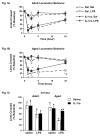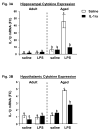Central inhibition of interleukin-1beta ameliorates sickness behavior in aged mice
- PMID: 19152833
- PMCID: PMC2704385
- DOI: 10.1016/j.bbi.2008.12.008
Central inhibition of interleukin-1beta ameliorates sickness behavior in aged mice
Abstract
In elderly individuals high levels of interleukin-1beta (IL-1beta) in the brain have been implicated in infection-related behavioral pathologies but this has not been directly tested. Therefore, the current study investigated if sickness behavior in aged animals elicited by peripheral injection of lipopolysaccharide (LPS) is mediated through central IL-1beta. Adult and aged mice were injected intracerebroventricularly with either saline or IL-1ra (4mug) immediately prior to intraperitoneal administration of saline or LPS (10mug) and locomotor and social behaviors were assessed. As anticipated, LPS depressed locomotor activity and social behavior in both adult and aged mice but the behavioral deficits were markedly greater in the aged at 24h. Pretreatment with IL-1ra did not affect LPS-induced sickness behavior in adults; however, in aged mice IL-1ra attenuated LPS-induced sickness behavior, restoring it to the level exhibited by young adults. Twenty-four hours post-injection hippocampal and hypothalamic tissues were collected to determine IL-1beta mRNA expression. Neither LPS nor IL-1ra affected IL-1beta mRNA levels in adults, presumably because any effect of LPS had dissipated by 24h. In contrast, IL-1beta mRNA was markedly higher in aged mice 24h after LPS, and prior treatment with IL-1ra either blocked or attenuated this effect in the hippocampus and hypothalamus, respectively. Taken together these data provide the first direct evidence that central IL-1beta is responsible for the severe sickness behavior observed in aged animals after LPS treatment. Thus, inhibiting the central actions of IL-1beta may be useful for minimizing behavioral complications in older individuals with an infection.
Conflict of interest statement
The authors declared no actual or potential competing interests. The experimental procedures involving animals were consistent with PHS guidelines and approved by the campus IACUC.
Figures



References
-
- Armstrong GL, Conn LA, Pinner RW. Trends in infectious disease mortality in the United States during the 20th century. Jama. 1999;281:61–66. - PubMed
-
- Barrientos RM, Higgins EA, Sprunger DB, Watkins LR, Rudy JW, Maier SF. Memory for context is impaired by a post context exposure injection of interleukin-1 beta into dorsal hippocampus. Behav Brain Res. 2002;134:291–298. - PubMed
-
- Bluthe RM, Dantzer R, Kelley KW. Effects of interleukin-1 receptor antagonist on the behavioral effects of lipopolysaccharide in rat. Brain Res. 1992;573:318–320. - PubMed
Publication types
MeSH terms
Substances
Grants and funding
LinkOut - more resources
Full Text Sources
Medical
Research Materials

